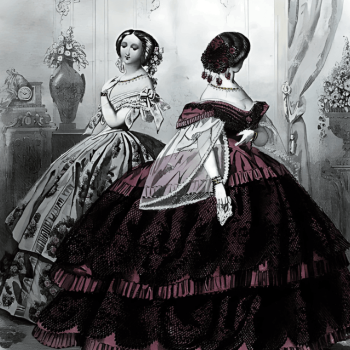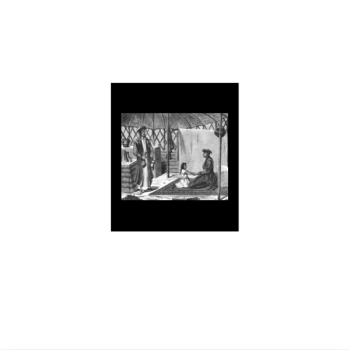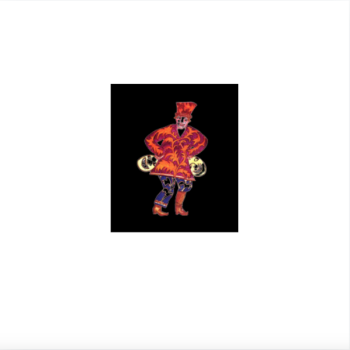IN THE MONASTERY
April 17, 1840.
The next day, early in the morning, the girls were taken to receive communion at the nunnery. Throughout the mass, Vera looked at the nuns with great curiosity. The abbess of the monastery was a small, thin woman, who wore long cloth robes, a cowl with a cloth cap, and was covered with fur around her forehead and her cheeks. Vera felt very sorry for her, as it must have been terribly hot. There was also a very beautiful nun, tall and plump, who sometimes visited Baba Lena. Vera loved her very much. She felt somewhat indignant on her behalf, wondering why she was not the most important nun there. It seemed to Vera that it would be much better if she leaned on that tall staff with a cross, and all the other nuns would bow at her feet, and not the little abbess with a yellow, wrinkled face.
Vera took communion without much feeling because she was still too young to understand the solemnity of the moment. She was much more interested in the fact that she washed down the communion with wine, herself, and took the bread from the table. After mass, the abbess invited them to take tea. Baba Lena, Vera, and Lelya went to see her, while Helena Andreevna, Aunt Nadya, and Aunt Katya went to the cathedral to watch the bishop wash the priests’ feet.
Having drunk tea with jam in the small, well-heated cell of the abbess, Baba Lena instructed the girls to kiss the abbess’s hand and began to say goodbye to her. At parting, the abbess placed mother-of-pearl rosaries with large carved crosses around the necks of Vera and Lelya and ordered a fair-haired little girl in a duckweed and a black cap to escort them out.
“Baba Lena!” said Lelya. “Shall we go to Aleeva now?”
“Yes,” Baba Lena replied.
Aleeva was a beautiful nun they knew, and Vera was very pleased to hear that they were going to visit her, but the girl in the black cap interested her greatly.
“Baba Lena,” she asked. “Is this little girl also a nun?”
“No, darling,” Baba Lena answered with a smile, “she’s just a monastery pupil. There are a lot of them studying here. The others were sent home for the holiday, but she is an orphan, and since she had nowhere to go, she remained here.”
“Won’t they force her to become a nun?” Lelya asked.
“What nonsense you are talking about!” said Baba Lena. “No one is taken into the monastery by force, Lelya.”
“Then why is she dressed like that?”
“All the pupils are dressed like this. When she comes out of school, she will take off both her duckweed and her black cap and put on a colored dress. The only thing that will remain monastic in her is that she will be smart, will be able to read and write, and will have an excellent knowledge of all kinds of work.” Baba Lena lightly pinched Lelya’s rosy cheek. “Honestly, girl?”
They drew level with the door on the threshold where Aleeva stood. Behind her was a partition that divided her spacious cell into a living room and a bedroom. Aleeva greeted her guests cheerfully, speaking to Baba Lena in French quickly and animatedly.
“This is not at all monastic,” Lelya whispered to Vera.
Having kissed them, Aleeva brought from behind the partition a whole basket with lovely eggs, decorated with bright velvet, satin, foil, and sparkles.
“Look at them,” said Aleeva, “and choose two for yourselves.” She then went into the depths of the room and sat down with Baba Lena on the sofa. Aleeva took the round cap and black veil off her head. The girls saw her thick dark brown hair, streaked with gray, was parted, and her face, flushed from the lively conversation, seemed even more beautiful. Aleeva’s spacious cell was much more like a room in a rich house than a nun’s dwelling and seemed even more full and beautiful after the austerity of the abbess’s room. The furniture was upholstered, and there were hyacinths and gillyflowers along the windows which filled the room with a wonderful fragrance. Paintings hanging on the walls, and one large painting which depicted a house and a large tree over a pond, stood unfinished on an easel by the window. The girls realized that she had drawn it herself, and they were very surprised by this. There were several books in beautiful bindings sitting on the desk. One, blue velvet, had a gold cross embossed on it. The girls did not touch it, supposing that it was a prayer book. But they were interested in another one, the scarlet velvet book, with the inscription: “Album.” Lelya, unable to bear it, opened it a little to peek inside. On the very first page, they saw a drawing of the same village house as depicted in the big picture on the easel. On the next page, there was a drawing of a man with a long beard and a very intelligent face.
“He looks like her!” Vera whispered to Lelya, pointing at Aleeva with her eyes.
Lelya nodded her head and was about to turn over the third page when Aleeva suddenly looked back at them.
“What are you looking at there, children?” said Aleeva. “Leave it! This is not for you.”
The girls walked away from the table ashamed, and Aleeva stood up, took the album, and carried it to show Baba Lena.
It seemed that Aleeva’s face suddenly became very sad. What the girls did not know, was that the man with the beard was Aleeva’s brother. He died somewhere far away in Siberia. He was very unhappy, Aleeva loved him so much that when he died, she abandoned the world and her rich estate, and went to live in a monastery.[1]
-
- MOTHERS & DAUGHTERS
- A LANTERN
- CHRISTENING OF THE DOLL
- DASHA & DUNYA
- GRUNYA
- NANNY NASTYA
- NANNY’S FAIRYTALE
- CONFESSION
- IN THE MONASTERY
- PREPARATIONS FOR THE HOLIDAY
- EASTER
- THE DACHA
- THE MELON POND
- MIKHAIL IVANOVICH
- THE WARLIKE PARTRIDGE
- LEONID
- NEW WINTER
- HISTORY OF BELYANKA
- THEATRES AND BALLS
- YOLKA
- REASONING
- ROAD
- CAMP
- IN NEW PLACES
- THE GRAY MONK
- VARENIKI
- THE TRIP TO DIKANKA
- WHAT HAPPENED IN THE DOLL HOUSE
- ANTONIA’S STORY
- “A WINTER EVENING”
- THE BLACK SEA
- CRIME AND PUNISHMENT
- PANIKHIDA
- PRINCE TYUMEN
SOURCES:
[1] Zhelihovskaya, Vera Petrovna. How I Was Little. A. F. Devrien. St. Petersburg, Russia. (1898): 70-74.













